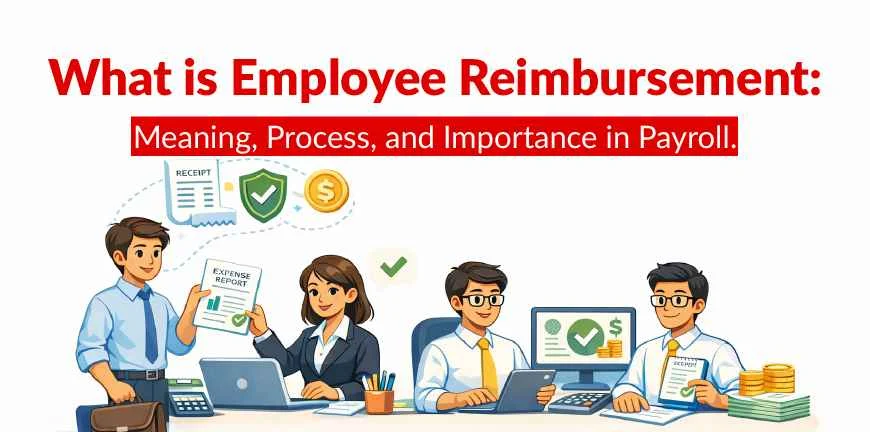
Top 50+ Payroll FAQs Answered by Industry Experts
18/07/2025
HR Leadership 2.0: Developing Workforce Resilience in Times of Economic Uncertainty
18/07/2025- What is AI in Payroll?
- How AI is Reshaping Payroll Workflows?
- What Are the Benefits of Using AI in Payroll?
- What are the Uses of AI in Payroll Processing?
- What is the Future of AI in HR and Payroll?
- What are the Tips for Using AI in Payroll?
- What are the Challenges in Adopting AI in Payroll Management?
- Key Takeaways
- Frequently Asked Questions (FAQs)
AI has become an inseparable component of most business operations across sectors and payroll is not an exception. Payroll management is no longer just restricted to salary disbursal and tax management activity rather a transformed into a powerful tool for improving employee experience and brand reputation. In the current competitive business arena, speed & accuracy must go hand-in-hand in every business operation to facilitate growth and maintain compliance.
AI in payroll acts as a catalyst to make payroll processing more effective through automation, continuous improvement, & seamless integration with all departments, leading to the best business outcomes. Let’s understand the role of AI in payroll from 360 perspective to help businesses make informed decisions on how to integrate Artificial Intelligence in Payroll smartly that generates favourable results.
What is AI in Payroll?
AI in payroll is the process of automating, optimising, & elevating the efficiency of the payroll system via end-to-end integration of artificial intelligence & machine learning technologies. The key role of AI in payroll is to diminish human involvement & efforts completely or to a maximum extent and increase the quality & speed of payroll processing.
The impact of AI in payroll is tremendous, with most companies investing heavily to replace their traditional payroll models with AI-powered ones to improve employee satisfaction, reduce resource expenses, and achieve better compliance.
Artificial Intelligence in payroll leverages self-learning ML algorithms, data analytics, & NLP (Natural Language Processing) to automate tasks that are categorised as repetitive and doesn’t require decision making to a large extent, perform complex payroll calculations in minutes, subtract tax and voluntary deductions and arrive at net salary, run compliance checks in real time, and respond to employee queries with greater accuracy and efficiency.
AI aids in detecting discrepancies, predicting possible risks beforehand, & ensuring timely salary disbursement while reducing manual intervention to zero or very minimal. Intelligent assistance in payroll also empowers smart forecasting of payroll budgets & provides valuable insights into workforce trends.
How AI is Reshaping Payroll Workflows?
Here is 5 ways AI in payroll is reshaping payroll processes:
1. Automated Calculations
AI can automatically extract employee data from the database and bucket it in one place to facilitate easy computation. Intelligent Assistance in payroll will handle salary, taxes, and deductions with precision ensuring manual intervention is minimal resulting in reduced errors and faster calculation of net salary for all employees.
2. Smart Compliance Monitoring
AI in payroll is revolutionising compliance monitoring through continuous data scanning and analysis. The capabilities of Artificial Intelligence in payroll allow it to monitor vast amounts of data and compare it with updated regulatory standards to flag differences and help companies make the required modifications in processes & policies in real time and achieve 100% compliance from a 360 perspective.
3. Predictive Analytics
The impact of AI in payroll is becoming more prominent when it comes to predicting future outcomes. The predictive analytics powered by AI will make use of historical data & outcomes, statistical algorithms and ML to create a roadmap for better payroll processing and compliance.
The aspects covered under AI-powered predictive analytics to assess future payroll needs include employee records, attendance (working hours, sign in & out, etc), leave patterns, performance metrics, etc.
4. Chatbots for Employee Queries
The future of AI in payroll includes self-learning chatbots that solve employee queries in real time and eliminate the need for a dedicated team for handling queries. AI-coupled chatbots with continuous improvement capabilities are offering a personalised experience & resolving complex employee queries related to payroll with precision, reducing HR workload significantly and enhancing employee payroll experience multifold.
5. Anomaly Detection
Intelligent Assistance in payroll helps in picking irregularities in payroll data, fraudulent transactions, violations, etc., through pattern detections and flagging techniques. Through machine learning and AI automation in payroll, inconsistencies and discrepancies can be detected in real-time thereby improving accuracy, efficiency, and security in payroll management systems.
What Are the Benefits of Using AI in Payroll?
The key benefits of using AI in payroll include:
1. Reduced payroll errors and Increased Accuracy
AI automation in Payroll helps in checking a vast amount of data in real time helping companies detect errors and anomalies early before they escalate into serious complications. AI in payroll ensures accurate payroll calculations minimising costly mistakes and improving accuracy resulting in better compliance and faster payroll processing.
2. Enhanced Compliance
Artificial Intelligence in Payroll helps companies stay updated with the amendments & changes in regulations & laws applicable to their sectors. By modifying payroll processes and policies according to the current regulations, companies can prevent penalties, lawsuits and streamline the payroll process for better results.
3. Cost Savings
The role of AI in payroll is significant when it comes to devising strategies that can reduce costs in the long run. By automating, streamlining, and increasing the operational efficiency of payroll, companies can make considerable cost savings as there will be reduced errors, better resource utilisation, and minimal human intervention.
4. Enhanced Employee Experience
Intelligent assistance in payroll allows employees to access self-service employee portals and chatbots, resulting in real-time issue resolving, instant access to payroll information, and personalised payroll support.
5. Better Data Analysis and Insights
The integration of AI in payroll helps companies analyse huge data in just minutes to generate valuable insights and patterns that can be used for making improvements and adding new elements to the payroll management system.
6. Better Integration with Other Systems
Artificial Intelligence in Payroll allows better integration with other systems like HR management, accounting platforms, and employee management systems. This facilitates better information flow and enhances end-to-end operations resulting in better business outcomes and employee experience.
What are the Uses of AI in Payroll Processing?
The key uses of AI in payroll include:
1. Automatic Data Entry
AI Automation in Payroll can facilitate automatic collection & entry of employee data, leaves, attendance, LOPs, tax slabs, voluntary deductions, and other relevant data into the payroll management system. This approach accelerates payroll processing with minimal to zero errors and promotes better compliance.
2. Data Validation and Optimisation
The algorithms running within Artificial Intelligence in Payroll help in validating and optimising data related to payroll through flagging and rectification of discrepancies, inconsistencies, fraud, errors, and missing information.
3. Working Hours and Leave Management
Intelligent Assistance in Payroll helps in effective management of working hours, sign-in and sign-out, leaves and employee attendance. AI systems will identify patterns, monitor working hours in real time, flag discrepancies &fraudulent clocking, streamlining attendance tracking and providing real-time insights to fix issues proactively.
4. Tax Compliance and Reporting
Artificial Intelligence in Payroll helps companies stay compliant with the latest laws by automatically upgrading payroll systems without HR efforts. The AI-powered payroll system helps in generating accurate reports that will help in on-time tax filing and remittance.
5. Fraud Detection and Prevention
The role of AI in payroll is vital when it comes to payroll fraud detection and prevention. The AI algorithms will analyse payroll data in real time to detect and flag unusual or wrong transactions such as incorrect overtime hours, duplicate payments, and other discrepancies. This will help companies fix these issues proactively and prevent further complications.
What is the Future of AI in HR and Payroll?
The future of AI in payroll is bright & pivotal, as it can significantly alter how payroll management is done from brand and employee perspectives. Here are some ways AI is going to shape the future of payroll:
- AI in payroll will move beyond automation to predictive and prescriptive HR and payroll capabilities.
- Organisations will forecast hiring needs and optimise payroll with data‑driven insights generated from Artificial Intelligence in Payroll.
- AI-powered payroll systems will manage multi‑country compliance and dynamic tax optimisation seamlessly.
- Real‑time error detection and correction through AI in payroll will ensure greater accuracy and transparency.
- Integrated AI chatbots will instantly resolve employee payroll and HR queries.
- Advanced analytics will highlight trends in workforce costs, engagement, and retention.
- AI in payroll will adapt processes to evolving labour laws and regulations automatically.
- HR teams can focus on strategic initiatives while Artificial Intelligence in Payroll will handle operational complexity.
What are the Tips for Using AI in Payroll?
Here are some vital tips to effectively use AI in payroll:
1. Set Clear Objectives with AI in Payroll
Companies must churn out well-defined objectives to maximise the potential use of AI in payroll. Deploying error minimisation protocols, compliance automation, or forecasting through Artificial Intelligence in Payroll must be a priority. Setting clear goals will help companies choose the right AI payroll system, implementation, and measure return on investment effectively.
2. Integrate with Different Systems
Companies must make sure the AI-enabled payroll platforms synchronise with HRIS information, attendance, leave & accounting management systems with minimum fuss. Perfect integration of intelligent assistance in payroll and other operations will prevent data silos, facilitate smoother workflows, & enhance overall payroll accuracy.
3. Prioritise Data Quality & Security
Companies must make sure accurate and up‑to‑date employee data is fed into AI systems & deploy robust cybersecurity protocols. High‑quality data ensures better predictions while protecting sensitive payroll information from breaches and cyberattacks.
4. Train HR and Payroll Teams
Companies must provide targeted training, so teams understand the role of AI in payroll, features, dashboards, and alerts. Trained payroll professionals equipped with AI usage knowledge can make the processes more optimised, decipher insights, & resolve complex issues in real time making the payroll process more effective.
5. Monitor & Continuously Improve
Companies must evaluate payroll reports generated by AI, alter configurations, & update algorithms regularly to continuously improve the payroll management system powered by AI. However, partnering with a payroll outsourcing agency like ALP Consulting can help companies integrate AI in payroll without involving the internal team and spending time on detailed AI usage training.
What are the Challenges in Adopting AI in Payroll Management?
The key challenges faced by companies in adopting AI in payroll include:
1. Data Privacy Concerns
Typically, payroll management involves handling a large amount of sensitive employee data. Integration of Artificial Intelligence in Payroll without robust cybersecurity protocols may make payroll systems vulnerable to cyberattacks, unauthorised access, or data leaks.
2. AI integration with Legacy Systems
A legacy payroll system may not be compatible with AI tools making it difficult or impossible for companies to integrate AI in payroll effectively. Forced integration with legacy systems can lead to more errors and make the payroll process ineffective.
3. Change Management
Employees may resist or become uncomfortable operating with payroll management systems embedded with AI. The reasons for this resistance may be fear of losing a job or spending more time understanding the nuances of AI automation in payroll.
4. High Initial Investment
Integrating intelligent assistance in payroll with existing systems, providing comprehensive training to payroll staff, and modifying processes to suit an AI environment can be expensive at the initial stage, even though highly profitable in the long run.
5. Skill Gaps in the Workforce
Some employees may not be tech-savvy and find it challenging to operate payroll management using AI. These skill gaps can lead to payroll errors which can lead to non-compliance and other complications.
Key Takeaways
- AI transforms payroll from manual processing to intelligent automation, improving accuracy, compliance, and overall efficiency.
- Predictive analytics in payroll enables better forecasting, workforce planning, and smarter budgeting decisions for companies.
- AI-powered payroll systems integrate seamlessly with HR, accounting, and attendance platforms, streamlining data management.
- Intelligent chatbots enhance employee experience by resolving payroll queries instantly and reducing HR workload significantly.
- Adopting intelligent assistance in payroll requires robust data security, training, and change management for successful implementation.
Frequently Asked Questions (FAQs)
1. What is the role of AI in payroll?
AI in payroll automates calculations, analyses pattern, detects anomalies, and enhances payroll efficiency, delivering accurate, compliant, and timely payments for employees.
2. How does AI improve payroll accuracy?
AI automation in payroll cross‑checks data, corrects inconsistencies, and learns from patterns to reduce manual errors, ensuring precise salary calculations and deductions.
3. Can AI help with payroll compliance?
Yes, Artificial Intelligence in Payroll tracks evolving tax laws and regulations, automatically updating payroll processes to maintain compliance and avoid penalties for violations.
4. Does AI in payroll replace human jobs?
Intelligent assistance in payroll streamlines repetitive tasks but complements human expertise, allowing payroll professionals to focus on analysis, strategy, and employee support.
5. What types of errors can AI detect in payroll?
AI in payroll identifies duplicate entries, incorrect hours, misclassified employees, missing deductions, and suspicious anomalies before payroll is finalised each cycle.
6. What are the future trends of AI in payroll management?
Future trends of Artificial Intelligence in Payroll include predictive analytics, multi‑country payroll integration, dynamic tax optimisation, real‑time compliance checks, and intelligent chatbots for instant support.
7. Is the Payroll Going to Be Automated?
Yes, routine payroll tasks are increasingly automated, but human oversight remains essential for complex decisions and exceptional cases requiring judgment.
8. Is Artificial Intelligence Taking Over Payroll?
The role of AI in payroll is to enhance payroll operations, not fully take over. Moreover, it augments human teams, improves accuracy, and drives efficiency across payroll management.
Contact Us For Business Enquiry

Yugandhara V. M
Yugandhara V. M serves as the Assistant Vice President – HRO at Alp Consulting Ltd., bringing over 14 years of rich experience in Human Resource Outsourcing, payroll management, and statutory compliance. He specializes in driving process excellence across HR operations, ensuring seamless service delivery and compliance with labor laws. Yugandhara’s expertise lies in managing large-scale client engagements, optimizing HR processes, and implementing efficient workforce management systems that enhance organizational performance. He also leads comprehensive payroll services, ensuring accuracy, timeliness, and compliance for diverse client portfolios.




